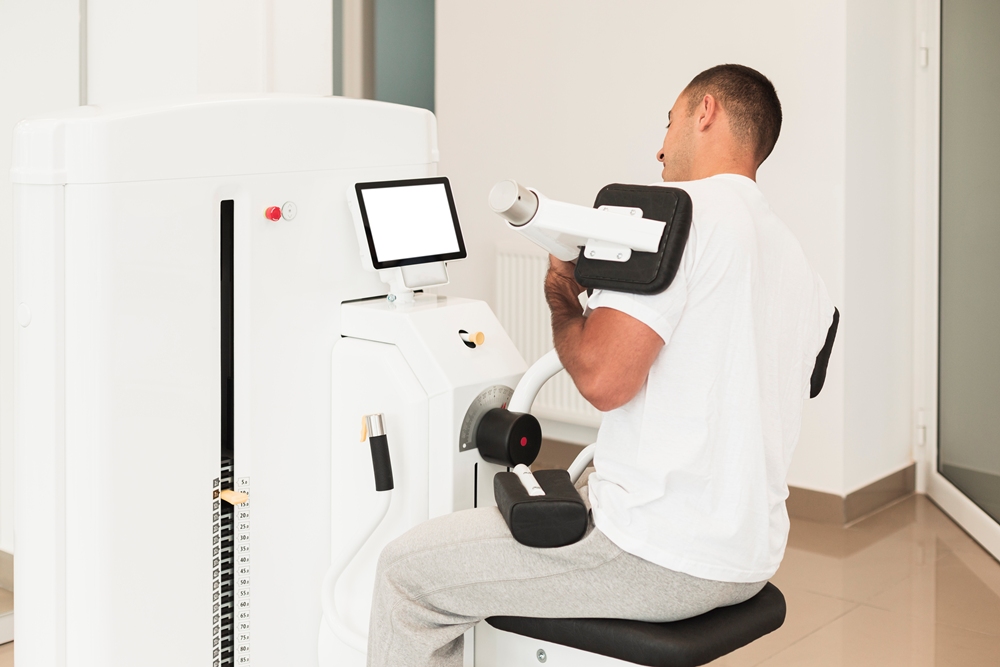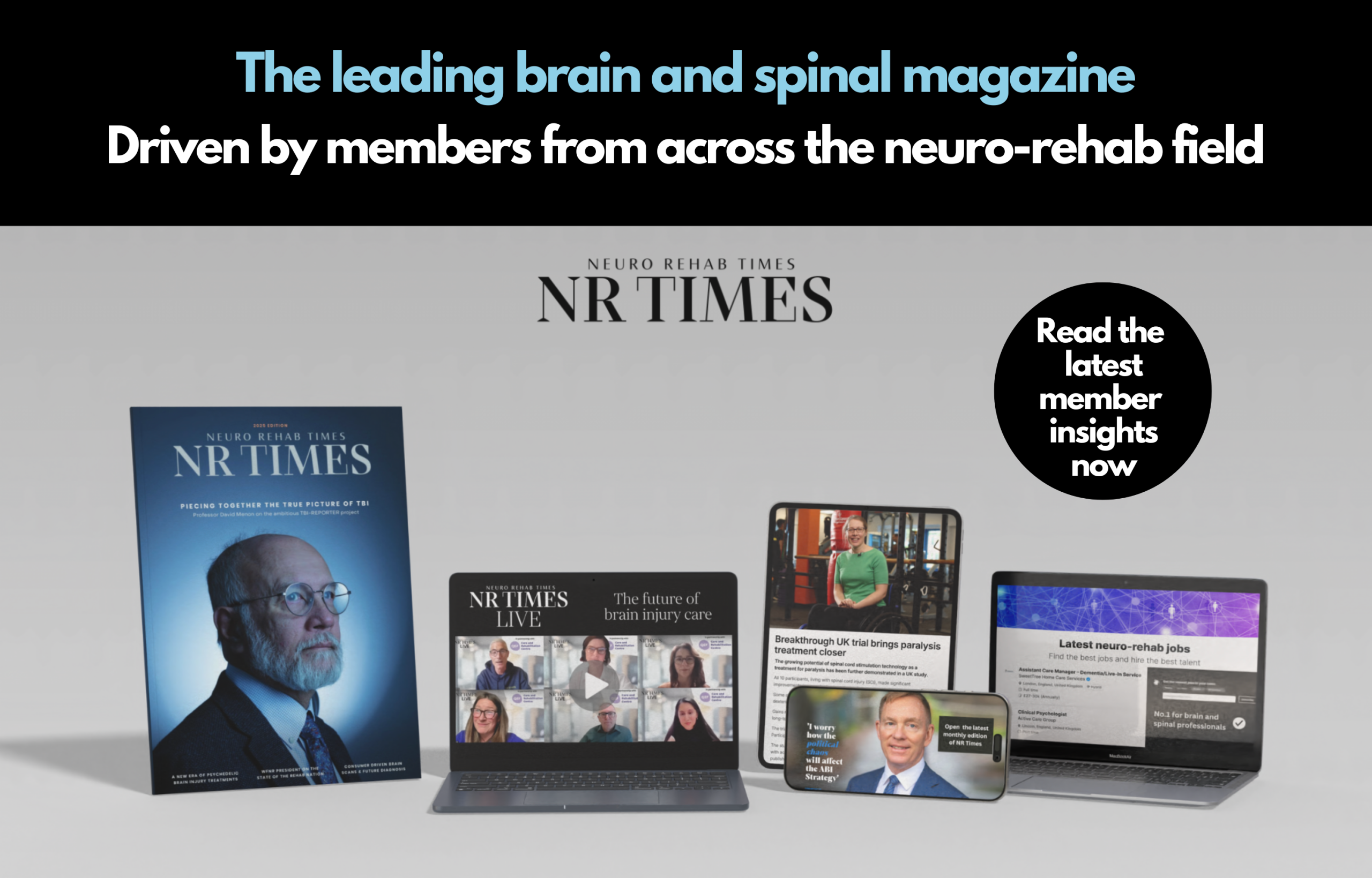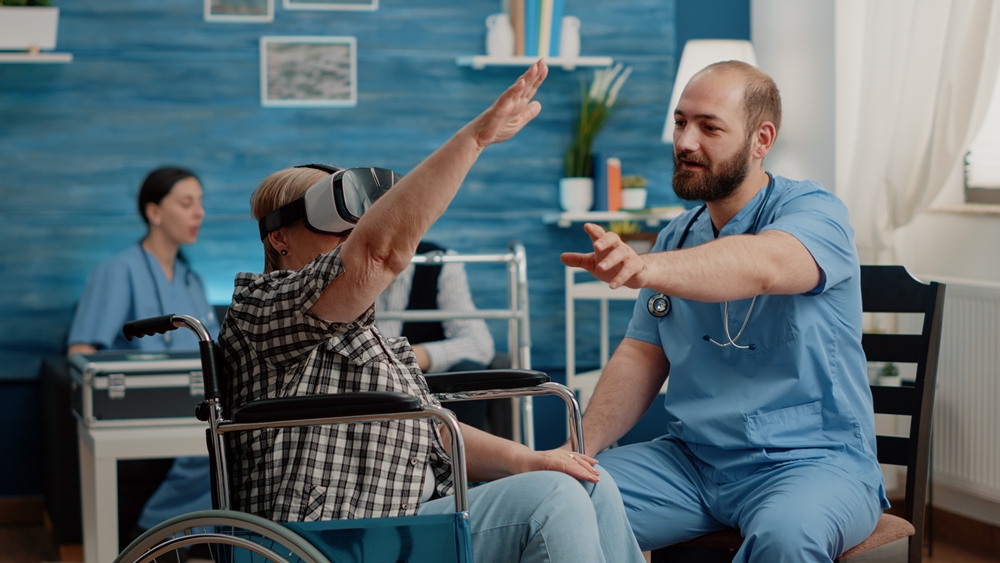Round up: Advancing neurostimulation stroke recovery therapy and more

NR Times explores the latest business and pharmaceutical developments in the world of neurorehabilitation.
New partnership to distribute of MedRhythms devices for stroke and Parkinson’s
Neurorehabilitation company MedRhythms has entered a strategic partnership with Edwards Health Care Services (EHCS), a leading provider of direct-to-home medical products.
The partnership enables nationwide distribution of MedRhythms’ currently available devices in the US.
This includes InTandem for adults with chronic stroke walking impairments and MOVIVE for people with Parkinson’s disease (PD), which will be distributed to patients with Medicare and/or commercial insurance.
InTandem and MOVIVE use music to deliver rhythmic auditory stimulation (RAS), a clinically proven neurorehabilitation intervention backed by more than 30 years of research.
The MedRhythms’ platform enables scalable delivery of RAS outside traditional care settings, unlocking meaningful clinical outcomes and long-term value in the stroke and PD rehabilitation markets.
In a multi-site randomised controlled trial published in Nature Communications, InTandem users experienced statistically significant and clinically meaningful gains in walking speed, and were over three times more likely to respond on average, versus active control.
In a feasibility study, MOVIVE was able to improve gait quality and facilitate moderate intensity gait training for PD participants.
“This partnership marks a significant expansion in access to both InTandem and MOVIVE,” said Joel Behnke, CCO of MedRhythms.
Building on our nationwide coverage for Veterans, people living with chronic stroke and Parkinson’s disease (PD) who have Medicare or commercial insurance can now access this life-changing therapy, making it easier for patients to begin their rehabilitation journey from the comfort of home.
“At Edwards Health Care Services, we are committed to improving access to innovative therapies that help people live healthier, more independent lives,” said Matthew Edwards, CEO of EHCS.
“Through this partnership with MedRhythms, we can deliver proven neurorehabilitation solutions directly to patients’ homes, supporting better mobility and quality of life for those managing Stroke Recovery and Parkinson’s disease.”
Advancing dynamic neurostimulation stroke recovery therapy
Panaxium Research and CoMotion at the University of Washington have announced that Panaxium Research has signed an exclusive option agreement to license IP concerning methods for therapy intended to help stroke patients recover lost functions due to brain damage.
Panaxium Research is developing new personalised, responsive neurostimulation therapies that will use dynamic stimulation protocols designed to respond in real-time to each patient’s individual brain anatomy, specific injury and recovery process.
“This agreement with CoMotion enables us to integrate cutting-edge research into our own platform to address one of the most urgent unmet needs in neurorehabilitation,” said Dr Brad Schmidt, CEO of Panaxium Research.
“By using the brain’s own signals to guide therapy, we believe we can help more stroke patients recover more function – even in cases where the patient’s recovery has long since plateaued, and even for many years post-injury.
“It is our aim to give new hope to millions who have had no effective therapies available to them.”
The agreement between Panaxium Research and CoMotion covers intellectual property co-owned by the University of Washington and Seattle Children’s, which includes Systems and Methods for Promoting Neuroplasticity in a Brain.
Panaxium plans to integrate this technology along with its own proprietary methods, which includes AI-enabled targeting, and the use of high-resolution tailoring of stimulation within the protocols.
The goal is to develop a next-generation precision stroke therapy that adapts to the brain’s natural recovery processes.
The licensed technology is currently being evaluated in a first-in-human clinical trial under an FDA Investigational Device Exemption (IDE).
CDSCO approval of xStep device for the treatment of paralysis
Vivatronix Tech and SpineX have announced that the Central Drugs Standard Control Organization (CDSCO), India’s national regulatory authority, has approved xStep for clinical and home use in India.
The xStep device delivers painless, noninvasive electrical stimulation to the spinal cord, without the need for surgery, to help restore motor function, mobility, and independence in individuals living with paralysis.
Formerly known as SCiP or SCONE, the xStep technology has been recognised by the US Food and Drug Administration (FDA) as a Breakthrough Device for two distinct indications.
The company states that the device has demonstrated promising results in multiple global clinical trials, and SpineX continues to collaborate on investigator-initiated studies validating the safety, efficacy, and transformative potential of non-invasive spinal neuromodulation therapy.
“xStep’s CDSCO approval represents a breakthrough for neurorehabilitation, bringing world-class, life-changing therapy within reach for patients in India and beyond,” said Dr Sachin Kandhari, MD, a leading Key Opinion Leader in neuromodulation and neurorehabilitation.
With CDSCO approval, SpineX and Vivatronix Tech are planning to expand access to advanced neurorehabilitation technology in India and worldwide.
Analysis of initial HeadSmart II trial concussion patients published
BRAINBox Solutions has published an analysis of the first 1,000 patients with suspected concussion (mild traumatic brain injury or mTBI) in its HeadSMART II study of its BRAINBox TBI test for concussion diagnosis and prognosis.
The analysis, the largest of its kind, identified patient characteristics at the first medical encounter shortly after injury that are associated with consequential, persistent (30-days) symptoms, setting the stage for its test for diagnosis and prognosis.
The HeadSmart II study supports BRAINBox TBI, which has received Breakthrough Device Designation from the FDA; the trial was designed in collaboration with the US Food and Drug Administration and leaders in emergency medicine, and neurotrauma.
The HeadSMART II trial is evaluating the diagnostic and prognostic potential of BrainBox TBI, a multimodal test that combines clinical data, neurocognitive testing, symptom reporting, and blood-based biomarkers, with proprietary AI algorithms to generate an objective score for diagnosis up to 96 hours from the time of injury.
The trial has included more than 1,650 subjects, with follow-up on symptoms occurring up to 90 days post-event.
The just published analysis focused on early clinical characteristics associated with persistent symptoms at 30 days in 803 of the first 1,000 patients in the HeadSmart II trial who had completed the first 30-day follow-up period.
The study population was divided roughly equally between males and females.
The study found that selected mTBI patients had persistent symptoms at 30 days, which remained constant over time: from 32.1 per cent at presentation to 35.5 per cent at 14 days, and 29.3 per cent out to 30-days.
The headache rate decreased from 73.5 per cent at presentation, to 62.5 per cent. Additional analysis of the 30-day follow-up data found a group of consistent symptoms or factors at initial presentation that were significantly associated with an increased probability of symptoms at 30 days. The company will report findings from the 90-day follow-up in the future.
The patients included in the analysis were seen in an Emergency Department (ED) within a median of 90 minutes after injury and completed a 30-day follow-up.
“In elderly patients, primarily over 65 years of age, there is a similar diagnostic/prognostic gap in distinguishing mTBI symptoms from neurodegenerative conditions such as dementias, including Alzheimer’s disease,” said co-author Damon Kuehl, vice chair for research in the Department of Emergency Medicine for Carilion Clinic.
“The elderly cohort in the overall HeadSMART II study suggests these factors may also aid in distinguishing these conditions.”
Results from the Phase 2 trial evaluating treatment for Parkinson’s Disease
Biotechnology company ABLi Therapeutics has announced final trial results from the Phase 2 “201 Trial” evaluating risvodetinib in patients with untreated Parkinson’s disease (PD).
The trial meet its primary endpoint in safety and tolerability demonstrating risvodetinib as safe and well-tolerated with a side-effect profile similar to placebo.
The 201 Trial is the first long-term dosing trial evaluating the selective, brain-penetrant c-Abl kinase inhibitor risvodetinib as a monotherapy in untreated PD.
The trial evaluated a 50 mg, 100 mg or 200 mg dose in 126 participants randomised 1:1:1:1 to either a dose of risvodetinib or placebo given once daily for 12 weeks.
Risvodetinib’s human exposure is two-fold to 200-fold higher than any c-Abl inhibitor currently approved for human use, necessitating the need to establish safety at 12-weeks before embarking on a registrational studies to measure the effect of Risvodetinib on the progress of disease.
Risvodetinib met the primary endpoint in safety and tolerability, showing that the fraction participants that experienced one or more adverse events and the average number of adverse events per person were similar to placebo.
Further, 95 per cent of enrolled participants completed 12-week dosing with 99 per cent dosing compliance; common adverse events such as nausea, diarrhea, vomiting, edema or cardiovascular events were no more frequent in participants administered any dose of risvodetinib as compared to participants administered placebo; and, risvodetinib impacted key secondary endpoints related to the Activities of Daily Living, the most important metric for evaluating clinical benefit.
“The outcomes of the 201 Trial were wholly unexpected,” said Dr Milton Werner, chairman and CEO of ABLi Therapeutics.
“We had seen a good safety profile with 7-day dosing, but didn’t anticipate the drug would have an adverse event profile similar to placebo at longer dosing durations, with none of the typical side-effects of other drugs in the class.
“A preliminary insight into clinical benefit may have been seen from secondary functional assessments, but the trial was not designed to measure efficacy.
“We think the most important measure beyond safety is the confirmation that Risvodetinib can reduce the alpha-synuclein pathology that drives Parkinson’s disease.”











